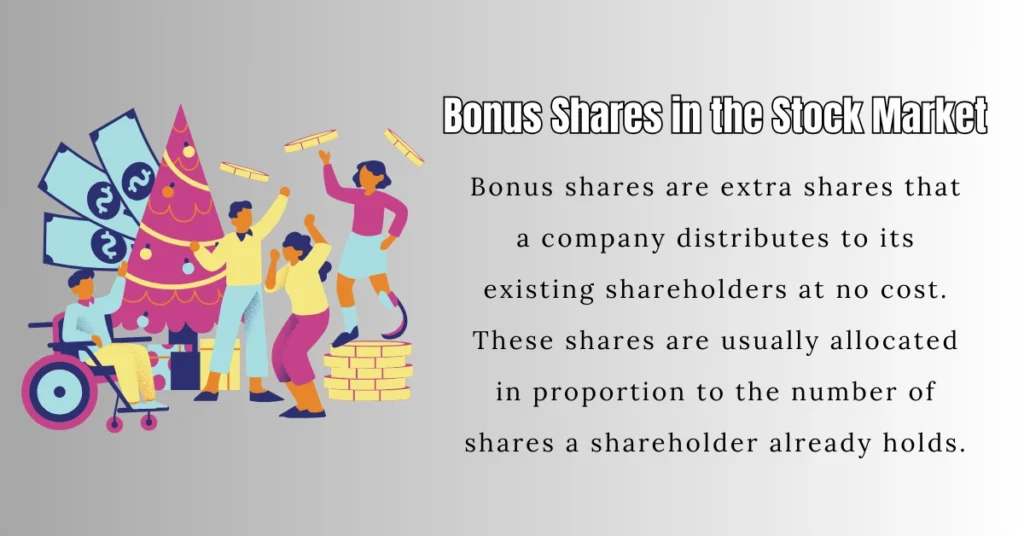Have you ever encountered the term bonus shares while exploring investment opportunities in the stock market? If so, you’re not alone.
Bonus shares can sound like a gift wrapped in financial jargon—but what do they actually mean?
Let’s dive into this topic, breaking it down step by step so that you can understand how bonus shares work, why companies issue them, and how they might affect your portfolio.
Bonus shares are extra shares that a company distributes to its existing shareholders at no cost. These shares are usually allocated in proportion to the number of shares a shareholder already holds.
For example, if a company announces a 1:2 bonus share issue, it means shareholders will receive one bonus share for every two shares they currently hold.
But here’s the catch—it’s not technically free money. The overall value of your holdings remains the same because the price of each share adjusts to account for the increased number of shares in circulation.
Think of it like slicing a cake into more pieces: you still have the same amount of cake, just in smaller slices.
Companies don’t hand out bonus shares randomly; there’s always a strategic reason behind it. Here are the main reasons:
Rewarding Shareholders: Bonus shares act as a way to reward loyal shareholders while showing the company’s optimism about its future growth. Bonus shares are a way for the company to say, “Thank you!”
They reward shareholders without costing the company cash, which is often more sustainable than issuing dividends.
By giving out bonus shares, the company shows it values its investors and is optimistic about its growth. This gesture can foster trust and encourage shareholders to stay invested for the long haul.
Improving Liquidity: Stock prices can sometimes climb so high that new investors find it intimidating to buy even a single share.
For instance, if a company’s stock is priced at Rs.10,000 per share, it might be out of reach for many smaller investors.
Issuing bonus shares increases the number of shares available in the market and simultaneously reduces the price per share.
Think of it like cutting a large pizza into smaller slices—it’s easier for everyone to grab a piece! This increased affordability often attracts more investors, boosting the stock’s liquidity (or ease of buying and selling in the market).
Capitalizing Reserves: Companies usually keep a portion of their profits as retained earnings—a reserve that ensures financial stability and helps fund future growth.
But hoarding too much cash in reserves isn’t always ideal, as it doesn’t directly benefit shareholders.
When a company issues bonus shares, it converts a portion of its retained earnings into share capital. It’s like converting savings into something productive, demonstrating that the company is financially sound and confident in reinvesting in itself.
Importantly, this process doesn’t deplete the company’s cash reserves, allowing it to maintain its liquidity while sharing wealth with investors.
When a company issues bonus shares, it’s natural to ask, What’s in it for me? While bonus shares don’t directly increase the total value of your investment, they come with several advantages that can benefit shareholders in meaningful ways.
1. Enhanced Liquidity
Imagine you hold a limited number of shares, and each one is worth a substantial amount. Selling just one share might feel like overcommitting or reducing your stake too much. With bonus shares in your portfolio, you gain more flexibility.
For instance, after receiving bonus shares, you might find it easier to sell a small portion of your holdings without compromising your overall exposure to the company.
This added liquidity makes it simpler to manage your investment strategy, whether you want to cash out or balance your portfolio.
2. Psychological Advantage
Let’s admit it—getting a bonus of any kind feels rewarding! Bonus shares can have a positive psychological impact on investors, making them feel valued and optimistic about the company’s future.
This sense of appreciation often fosters stronger loyalty among shareholders. Knowing that the company is confident enough in its growth to reward investors can boost morale and encourage you to stick around for the long haul. It’s a subtle way for companies to strengthen their relationship with shareholders.
3. Long-Term Gains
Bonus shares might not seem like a jackpot at first glance, but their real value shines in the long term. If the company performs well, the additional shares can significantly enhance your overall returns.
Think of it as planting extra seeds in a garden. At first, you might not notice much change, but over time, those seeds can grow into a lush, flourishing financial tree.
Holding onto bonus shares during a company’s growth phase can be a smart strategy, as you’ll benefit from any future appreciation in stock value.
The Bigger Picture
While bonus shares might not make you instantly wealthier, they can play an important role in helping you build a stronger, more flexible portfolio.
Whether through increased liquidity, a boost in confidence, or long-term value creation, these additional shares add layers of opportunity for investors willing to think beyond the short term.
When you understand these benefits, it’s easier to see why bonus shares are often celebrated by shareholders as a thoughtful and strategic reward.
Bonus shares might seem like a win-win, but they’re not without their drawbacks. While they offer several advantages, it’s important to consider the potential downsides to make a well-rounded investment decision.
Here are a few things you should keep in mind:
Diluted Earnings Per Share (EPS): When a company gives out bonus shares, the total number of shares in circulation increases.
This means the same profits are now spread across a larger number of shares, leading to a lower Earnings Per Share (EPS).
Why does this matter? EPS is an important metric used by investors and analysts to assess a company’s profitability.
A decline in EPS—though purely mathematical in this case—might give the impression that the company’s performance is weakening, even when its overall financial health remains unchanged.
No Immediate Cash Benefit: Unlike dividends, which put cash directly into your pocket, bonus shares don’t provide an instant financial reward. Their value lies in potential long-term growth, which requires patience.
This can be a drawback for investors seeking immediate income or returns, such as retirees or those relying on dividends to cover expenses.
If you’re someone who prefers tangible payouts over future promises, bonus shares might not feel as rewarding.
Market Sentiment: The stock market thrives on perception, and not every investor interprets bonus shares in the same way.
While some might see them as a sign of a company’s confidence and goodwill, others might view them with suspicion.
For instance, if a company issues bonus shares frequently, it could be misinterpreted as an attempt to mask deeper financial problems, such as a lack of growth opportunities or declining profitability.
This uncertainty can lead to temporary stock price volatility as the market adjusts to the news.
Are you eager to leverage bonus shares to your advantage? Here are a few tips:
- Understand the Fundamentals: Before investing, ensure the company issuing bonus shares has a solid track record and promising growth prospects.
- Hold for the Long Term: Bonus shares often yield the best returns when held over an extended period, especially for growth-oriented companies.
- Diversify Wisely: Don’t rely solely on companies issuing bonus shares. A diversified portfolio is your best defense against market fluctuations.
In most countries, the bonus shares themselves aren’t taxable when issued. However, any capital gains earned from selling them may be subject to taxes.
Yes, once the bonus shares are credited to your demat account, you’re free to sell them. However, it’s wise to evaluate their potential for long-term growth before doing so.
Yes, indirectly. Since the number of shares increases, the dividend per share might decrease unless the company increases its total dividend payout.
Final Thoughts
Bonus shares are a fascinating aspect of the stock market, offering a unique way for companies to reward shareholders without impacting their cash flow.
While they might not provide instant riches, they can play a vital role in a long-term investment strategy.
So, the next time you hear about a bonus share announcement, don’t just sit on the sidelines. Analyze the company’s fundamentals, weigh the pros and cons, and decide if it’s an opportunity worth embracing. Who knows? It might just be the icing on your financial cake!



